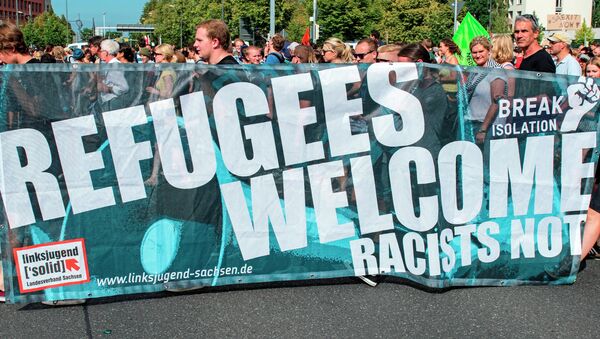Police in the southern German city of Munich were this week forced to plead with the public to stop bringing donations to help the thousands of migrants arriving at the city’s central rail station. They said they were "overwhelmed".
In other cities across Germany football fans held up banners saying "Welcome Refugees" last weekend as a website was created to match offers of a home with refugees.
Finally Germany is ready to welcome more and more refugees. Alhamdulillah — #refugeeswelcome pic.twitter.com/ElCgayysXr
— Issam Bayan (@Issam_Bayan) September 3, 2015
German Chancellor Angela Merkel has played down some dissent among Germans and slammed violence towards arriving refugees and migrants as she staunchly called for other European countries to be as generous as hers.
"REFUGEES WELCOME". Banners draped across Germany's football stadiums this weekend. (@markito0171) pic.twitter.com/fJYq0xXrXe
— Jack Moore (@JFXM) August 30, 2015
Last week, Berlin said it would waive the so-called Dublin Rules, which state that migrants and refugees must be processed at the point of entry into the European Union. Germany said it will stop returning Syrian asylum seekers to their first port of entry in the EU. Natasha Bertaud, spokeswoman for the EU Commission told reporters:
"For the commission, this constitutes a recognition of the fact that we cannot leave the member states at the external borders alone in dealing with a large number of asylum seekers seeking refuge in Europe."
A Divided Nation
To understand why Germany has broken ranks in Europe and is set to take in up to 800,000 refugees, one needs to consider the history of the country.
After the Second World War when Germany was divided and the Berlin Wall erected, thousands of people attempted to escape Communist East Germany and risked their lives crossing over into West German to flee persecution.
For much of its length, the so-called Iron Curtain – that stretched 1,400km from the Baltic to Bavaria – consisted of three or four deep sections of security: a metal fence, tripwires which activated automatic shooting installations, a minefield and – if you made it that far – another fence.
Thousands risked their life and ran the gauntlet of 24 hour border guards watching for strategically-placed lookout towers along its length. There were many in the West who braved their lives numerous times assisting people from East Germany to cross into the West. They were known as Fluchthelfers – literally flight-helpers and have become part of the German psyche.
Amazing #Germany. Tarin in Dresden welcoming refugees with arabic text "you are welcome" v @Donrok @akhbar pic.twitter.com/S4KnlX11HW
— Jenan Moussa (@jenanmoussa) September 1, 2015
On reunification in 1990, the Deutsche Mark replaced the Ostmark, giving it parity with the western currency – which was enormously costly but hugely generous. Whole families that had been split by the Iron Curtain were re-united. Germany found its unified soul once again.
Angela Merkel was born in Hamburg, West Germany of Polish parents. They moved to East Germany when she was young and she spent much of her childhood and student life there. She more than any other politician in Europe is aware of a divided nation and of political oppression under the Communist regime. She too understands the plight of the Syrians, escaping a country in crisis and civil war looking for new hope in West Germany.
We call on #Europe's governments to respond with humanity #HumanityWashedAshore pic.twitter.com/1SHb9Kwcmt
— UN Refugee Agency (@Refugees) September 4, 2015
Article 16a of the Basic Law of Germany grants victims of political persecution an individual right of asylum. The fundamental right of asylum thus has high priority and expresses Germany’s willingness to fulfill its historical and humanitarian obligation to admit refugees.
As other countries in Europe wring their hands and arguing over quotas and border controls, it is Germany that is looking to its soul and opening its arms to those in such desperate need today.



